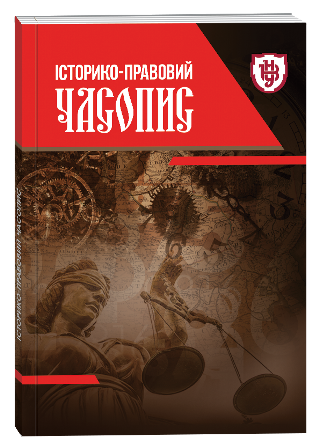TO THE QUESTION OF THE PSYCHOLOGICAL ORIGINS OF THE PRINCIPLE OF JUSTICE IN THE ANCIENT CIVILIZATIONS OF MESOPOTAMIA
DOI:
https://doi.org/10.32782/2409-4544/2024-2/2Keywords:
Theory of law, psychological theory of law, philosophy of law, evolutionary psychology, Ancient EastAbstract
An attempt is made in the article to provide a modern rationale for the origin of the principle of justice, ‘an eye for an eye’, in the ancient civilizations of Mesopotamia through the lens of the psychological theory of law. This theory posits the subjective mental world of the individual as the source of legislation, its comprehensibility, and its authority. Drawing on prominent examples from major literary and legal monuments such as the Code of Hammurabi, the Sumerian- Akkadian Epic, the Bible, the Aggadah, and the Quran, the article offers an overview and critical of verification of the theological theory of the origin of laws in the Ancient East. This theological perspective, once advocated by early thinkers and latently supported by certain modern scientists, is scrutinized in light of its organic ties to the historical transformations of society, philosophical thought, and its evolution into the foundation of Near Eastern despotism. The author concludes that, while economic, social, and situational factors cannot be disregarded, the formation of the principle of justice in ancient Mesopotamian cultures was primarily influenced by two fundamental human emotions: anger, as the basis of retributive justice for the wronged party, and fear, as the primary deterrent to arbitrary violence. These emotions, in combination with prognostic reasoning, which emerged at a particular stage in human evolutionary development, played a decisive role. The article emphasizes that the emergence of ‘justice’ as a social-legal phenomenon is itself a natural and predictable outcome of the increasing complexity of systems in the world, from inorganic matter to social structures. The role of individual political actors is minimized in favor of recognizing the broader societal understanding of justice and the existence of unwritten laws in Mesopotamia. This unwritten legal tradition parallels similar phenomena in other cultures, such as the Old Rus’ legal code, ‘Pravda Ruska’. A significant milestone, however, was the codification of laws and their endorsement by state authority. This ensured that traditional norms were not violated or distorted. The article further states how the legal system of Mesopotamia, later reinterpreted and augmented with elements such as Abrahamic monotheism and the Christian principle of mercy, directly influenced subsequent legal and social developments. The material presented allows the author to outline the dialectical progression of legal and societal history, from the authority of tribal despots to increasingly democratic forms of governance. By examining these historical transformations, the article underscores the interplay of psychological, cultural, and philosophical factors in shaping the principles of justice and law in ancient Mesopotamia and beyond. This analysis demonstrates that the principle of justice is deeply rooted in the psychological makeup of humans and reflects the evolutionary trajectory of human societies toward greater complexity and fairness in legal and social systems.
References
Bialik H.N., Ravnitzky Y.H. The Book Of Legends Sefer Ha Aggadah. Legends from the Talmud and Midrash. New York : Schocken books, 1992. 897 p.
Rahlfs A., Hanhart R. Septuaginta: Editio altera. Stuttgart : Deutche Bibelgesellschaft, 2016.
Гамалія К. Найдавніші міста світу: початок урбаністичних процесів на території Месопотамії. Народознавчі зошити. 2013. № 5. С. 795–802. URL: http://nbuv.gov.ua/UJRN/NaZo_2013_5_6 (дата звернення: 11.10.2024).
Куфтирєв П.В. Правові системи давніх держав Месопотамії як джерела для формування концептів доказового права. Прикарпатський юридичний вісник. 2018. Вип. 1. С. 12–15. URL: http://nbuv.gov.ua/UJRN/Pjuv_2018_1_5 (дата звернення: 9.11.2024).
На ріках вавілонських. З найдавнішої літератури Шумеру, Вавілону, Палестини / упоряд. М.Н. Москаленко. Київ : Дніпро, 1991. 398 с.
Платон. Держава / пер. з давньогр. Д. Коваль. Київ : Основи, 2000. 355 с.
Преславний Коран / пер. з араб. М. Якубовича. Медіна : Центр імені Короля Фагда з друку Преславного Сувою, 2013. 991 с.
Сухацький Р.П. Вплив законодавства на розвиток суспільства й держави загалом на прикладі законів Хаммурапі. Науковий вісник Ужгородського національного університету. Серія : Право. 2015. Вип. 31(1). С. 40–46. URL: http://nbuv.gov.ua/UJRN/nvuzhpr_2015_31(1)__12 (дата звернення: 11.11.2024).
Франко І.Я. Сотворення світу. Київ : Обереги, 2004. 160 с.
Хаммурапі. Кодекс законів. веб-сайт. URL: https://thales2002.narod.ru/chammuratext.html (дата звернення: 11.10.2024).







